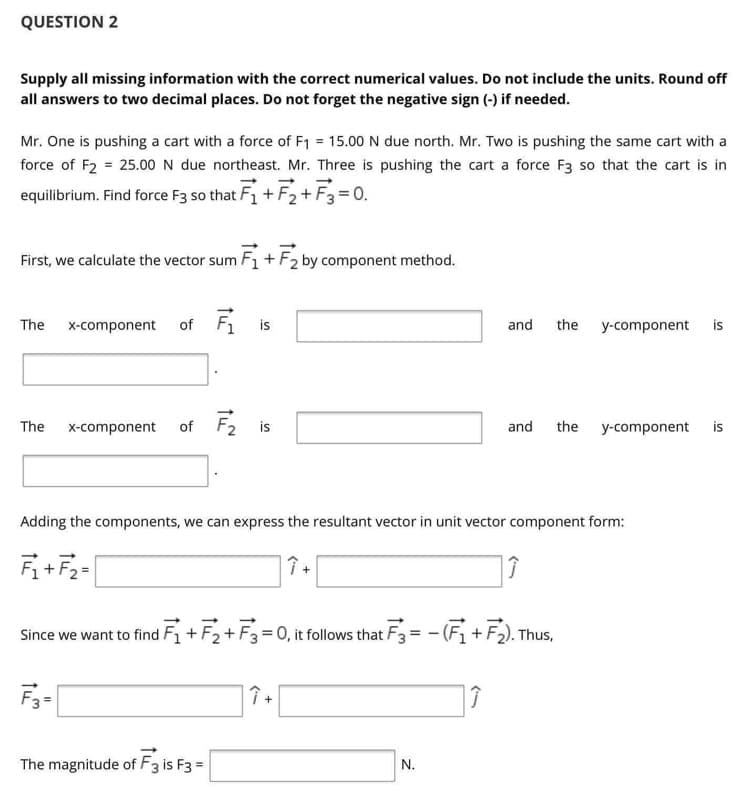Mr. One is pushing a cart with a force of F1 = 15.00 N due north. Mr. Two is pushing the same cart with a force of F2 25.00 N due northeast. Mr. Three is pushing the cart a force F3 so that the cart is in equilibrium. Find force F3 so that F1 + F2 +F3= 0.
Mr. One is pushing a cart with a force of F1 = 15.00 N due north. Mr. Two is pushing the same cart with a force of F2 25.00 N due northeast. Mr. Three is pushing the cart a force F3 so that the cart is in equilibrium. Find force F3 so that F1 + F2 +F3= 0.
Physics for Scientists and Engineers: Foundations and Connections
1st Edition
ISBN:9781133939146
Author:Katz, Debora M.
Publisher:Katz, Debora M.
Chapter3: Vectors
Section: Chapter Questions
Problem 8PQ: The layout of the town of Popperville is a perfectly square grid, with blocks 100 feet long (Fig....
Related questions
Topic Video
Question

Transcribed Image Text:QUESTION 2
Supply all missing information with the correct numerical values. Do not include the units. Round off
all answers to two decimal places. Do not forget the negative sign (-) if needed.
Mr. One is pushing a cart with a force of F1 = 15.00 N due north. Mr. Two is pushing the same cart with a
force of F2 = 25.00 N due northeast. Mr. Three is pushing the cart a force F3 so that the cart is in
equilibrium. Find force F3 so that F1 + F2+F3=0.
First, we calculate the vector sum F1 + F2 by component method.
The
x-component
is
and
the y-component
is
The
x-component
of F2 is
and
the
y-component
is
Adding the components, we can express the resultant vector in unit vector component form:
Since we want to find F1 + F2 + F3 = 0, it follows that F3 = - (F + F2). Thus,
F3=
|7•[
The magnitude of F3 is F3 =
N.
of
Expert Solution
This question has been solved!
Explore an expertly crafted, step-by-step solution for a thorough understanding of key concepts.
Step by step
Solved in 3 steps

Knowledge Booster
Learn more about
Need a deep-dive on the concept behind this application? Look no further. Learn more about this topic, physics and related others by exploring similar questions and additional content below.Recommended textbooks for you

Physics for Scientists and Engineers: Foundations…
Physics
ISBN:
9781133939146
Author:
Katz, Debora M.
Publisher:
Cengage Learning

University Physics Volume 1
Physics
ISBN:
9781938168277
Author:
William Moebs, Samuel J. Ling, Jeff Sanny
Publisher:
OpenStax - Rice University

Glencoe Physics: Principles and Problems, Student…
Physics
ISBN:
9780078807213
Author:
Paul W. Zitzewitz
Publisher:
Glencoe/McGraw-Hill

Physics for Scientists and Engineers: Foundations…
Physics
ISBN:
9781133939146
Author:
Katz, Debora M.
Publisher:
Cengage Learning

University Physics Volume 1
Physics
ISBN:
9781938168277
Author:
William Moebs, Samuel J. Ling, Jeff Sanny
Publisher:
OpenStax - Rice University

Glencoe Physics: Principles and Problems, Student…
Physics
ISBN:
9780078807213
Author:
Paul W. Zitzewitz
Publisher:
Glencoe/McGraw-Hill

College Physics
Physics
ISBN:
9781285737027
Author:
Raymond A. Serway, Chris Vuille
Publisher:
Cengage Learning

College Physics
Physics
ISBN:
9781938168000
Author:
Paul Peter Urone, Roger Hinrichs
Publisher:
OpenStax College
